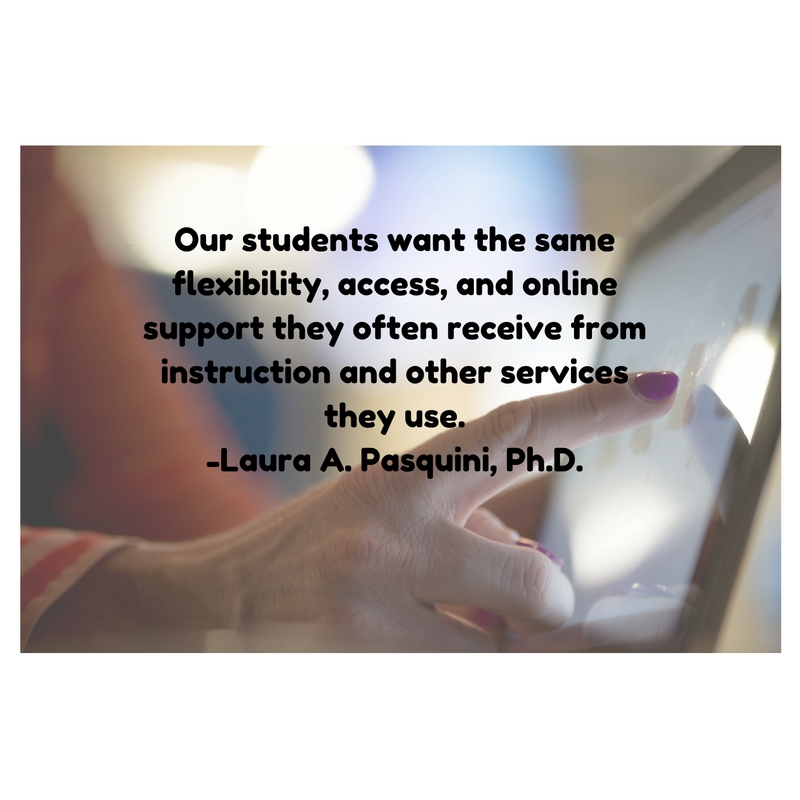Commission for Academic Support in Higher Education
Thursday, 15 December 2016 - 1:05pm
ACPA CASHE Webinar Spotlight: Academic Support In A Digital Age
Name: Laura A. Pasquini, Ph.D.
Institutions & Job Title:
Lecturer, Learning Technologies, College of Information, University of North Texas
Researcher, The Digital Learning and Social Media Research Group, Royal Roads University
Why do we need to consider the digital aspects for student support?
Although you might not advise or support students in an online degree program, there are increasing efforts for teaching and learning technology. Learning delivery and design does impact how we support our students, and we mediate much of our work in higher education using digital tools and platforms. That being said, any adoption of technology should be led with informed decisions on modifying pedagogical methods (Bates, 2015), which is directly related to our advising models and programs we offer in the post-secondary.
Our students want the same flexibility, access, and online support they often receive from instruction and other services they use. When learning with technology, our students are accustomed to having access to student support or other features alongside their online/blended coursework; however, the digital student success side is frequently an afterthought for these technology determinations. We need to have more student success and academic advising programs consider the best technology to provide advising content and service delivery (Steele, 2015) for a more learner-centered approach.

How do you envision academic support being impacted by technology in higher ed?
Whether you are leveraging technology to optimize your student support services or your campus is transitioning to either a blended or online student services model, there is both a need and desire to improve technology for academic advisors and student support practices in higher education (Pasquini & Steele, 2015). There are many ways we leverage technology, and this piece of our planning will require more divisions to ask critical questions before selecting technology-mediated environments for advising and learner support. Here are a few questions to discuss with your advisory group:
- What technologies is your institution currently utilizing for academic advising or student support?
- How does your division or unit on campus decide on the most appropriate mode of technology delivery? [Will this be a campus-wide decision?]
- What factors should be determined when designing technology in advising program and/or student support functional area?
- What other strategies and structural support might benefit your campus in preparing staff to support learners digitally? (e.g. training, skill development, etc.)
What are a few resources you can suggest the ACPA CASHE review from the webinar?
I shared a few highlighted slides for my Higher Education and Administrative Leadership (HEAL 570) class from Royal Roads University – as we discussed Selecting Technology for Higher Ed as a central part of this course curriculum. To further understand the current trends and research, I might suggest the following reading list of articles, books, and reports to let you know what evidence-based practices are currently out there in the area of technology for advising and student support:
Bates, A. W., (2015). Chapter 9: Modes of delivery. In Guidelines for designing teaching and learning for a digital age. Open Text BC.
Pasquini, L. A., & Steele, G. (2016). Technology in academic advising: Perceptions and practices in higher education. figshare. Retrieved from https://dx.doi.org/10.6084/m9.figshare.3053569.v7
Steele, G. (2015). Using Technology for Intentional Student Evaluation and Program Assessment. NACADA Clearinghouse of Academic Advising Resources.
Additional Resources and Guides:
- WCET’s Guidelines for Creating Student Support Services Online [PDF]
- UCF’s Blendkit Course (#Blendkit2015) & Blended Learner Interactions
- Checklist for Selecting Technology using Dr. Tony Bates SECTONS framework from his latest book http://opentextbc.ca/teachinginadigitalage/
- University Design for Learning (UDL) Guidelines 2.0
- Horizon Report for Higher Ed 2016
Related Professional Organizations Who Support Online Learners:
· EDUCAUSE – Specifically the Educause Learning Initiative (ELI) and Educause Center for Analysis and Research (ECAR)
· National Distance Education and Technological Advancement (DETA) Research Center: The DETA Summit (Feb. 2015) & my blog re-cap
· WICHE Cooperative for Educational Technologies (WCET)
· Quality Matters – Online Course Design Benchmark; 8 quality standards rubric

